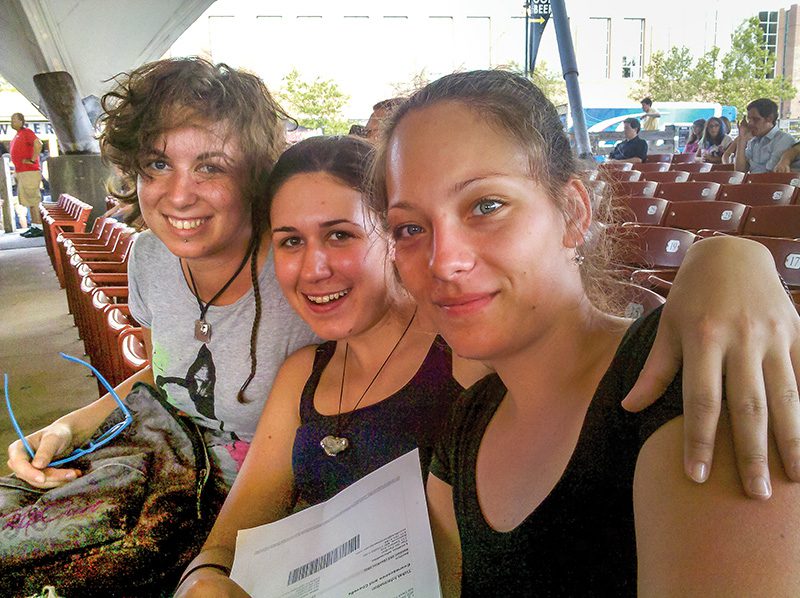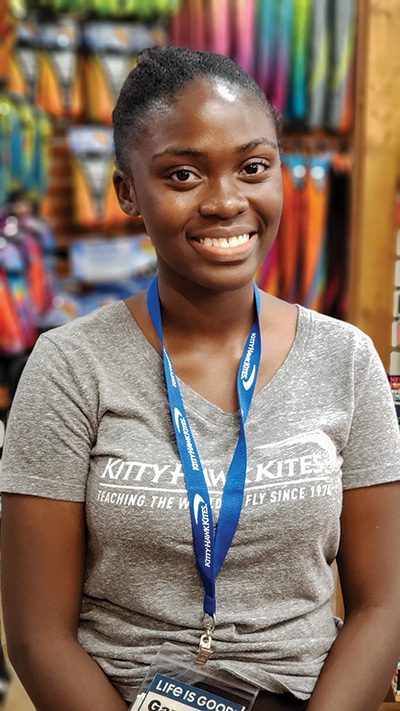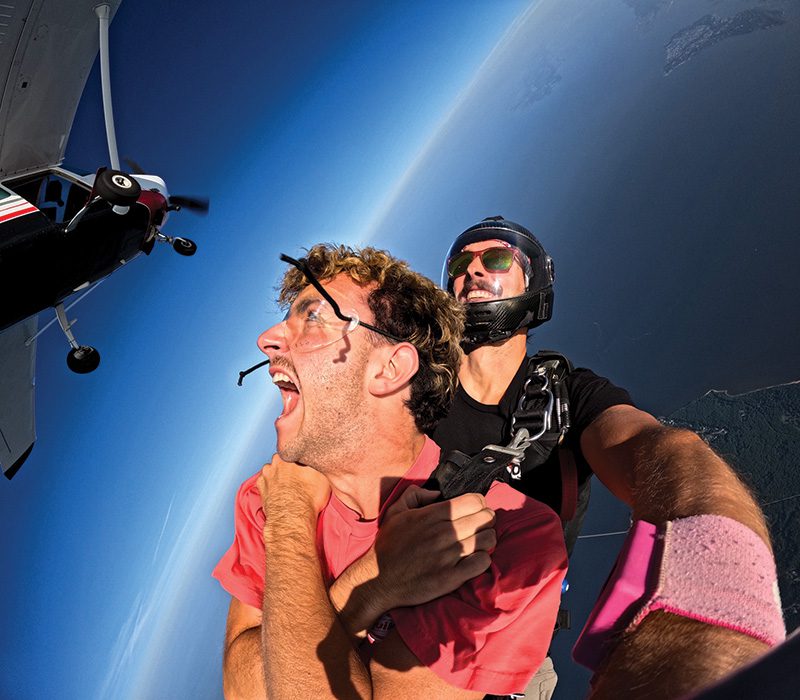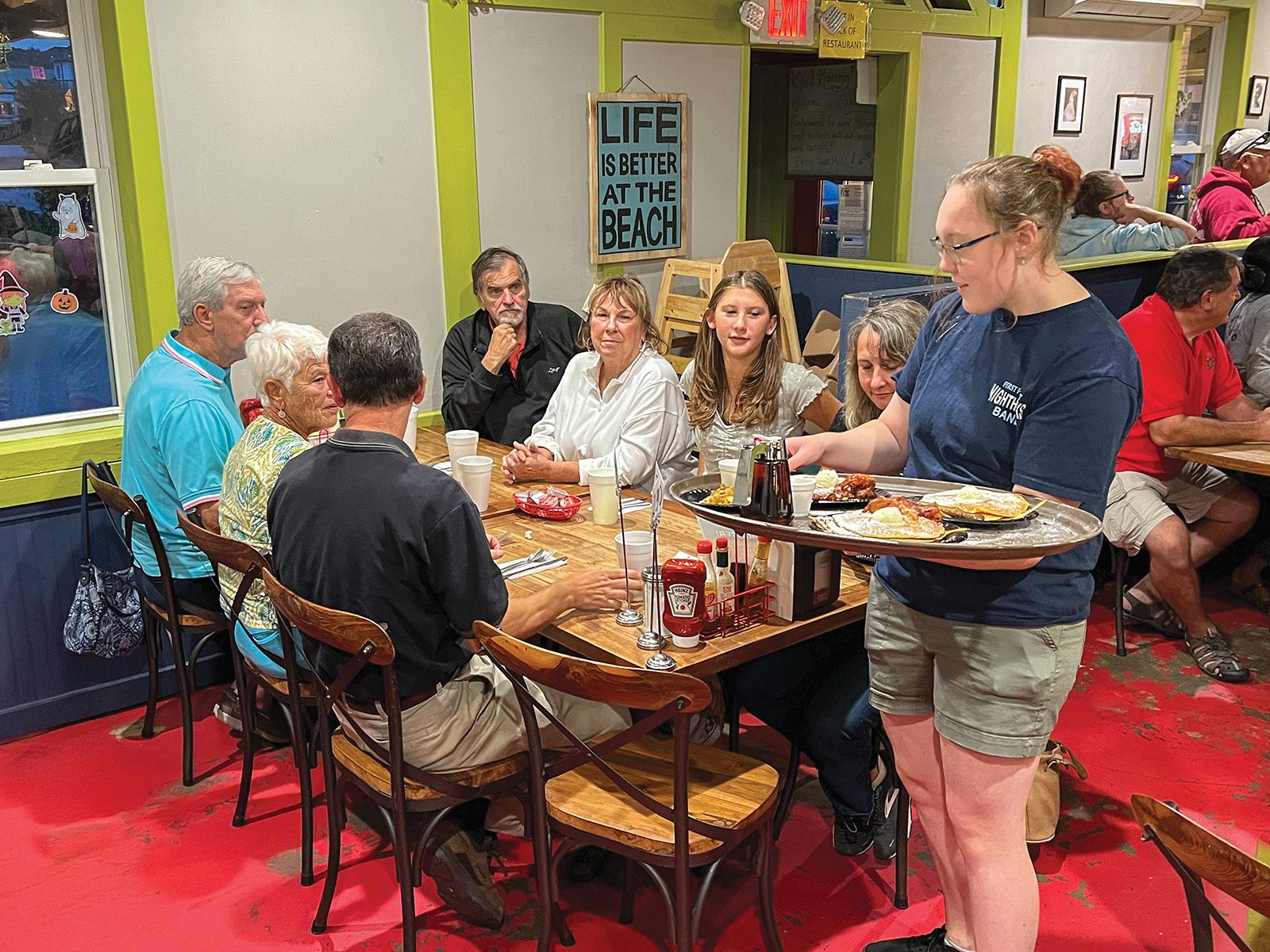International Flavor
J-1’s Living the OBX Dream
by Steve Hanf
Thirteen years ago, two sisters and their best friend boarded a plane in Bulgaria with nothing more than overstuffed backpacks and visions of America gleaned from TV shows and movies.
After two long flights, they made it to Newark International Airport in New Jersey. A train ride landed them in New York City. A Greyhound bus brought them to Norfolk. Then, their landlord for the summer drove them to the Outer Banks to end four days of travel and begin four months of life-altering experiences.
The trio spent the summer of 2012 working at Five Guys as part of the J-1 Visa Summer Work Travel Program. They went to the beach with each other and fellow international students from around the world. They visited the home of their restaurant manager for Mexican food and a futbol watch party. Thanks to finding the “sweetest” landlord — “I don’t know if all the students have this kind of luck, but we did,” says Dessy Qabrawi — they met an unending stream of locals, enjoyed food at countless OBX restaurants and even did some traveling.
Thirteen years later, they’re 30-somethings back in their home country with spouses and kids and dogs. They’ve all completed university studies, begun careers and started families. And as they gather for a video call to chat about that summer at the beach in the J-1 program, it becomes clear how life-changing the experience was for them — and the untold millions of students just like them who journey to the United States every summer.
“There’s before going there, and after going there,” Dessy explains. “We experienced something that really changed us. It’s part of you in some sense, not just a memory. I don’t know how to explain it.”
 Whenever Dessy gets together with sisters Gabriela Eneva and Rositsa Georgieva, the memories and stories come in waves as though it all happened yesterday. Rositsa mentions the awesome Linkin Park concert the trio attended in the not-so-awesome city of Camden, New Jersey: ”All the bullet holes in the buildings!” Rositsa recalls, drawing laughs about that trip. They somehow ended up at First Flight High School’s graduation ceremony and marveled at how “mature and normal” it was compared to similar celebrations in Bulgaria, Dessy adds.
Whenever Dessy gets together with sisters Gabriela Eneva and Rositsa Georgieva, the memories and stories come in waves as though it all happened yesterday. Rositsa mentions the awesome Linkin Park concert the trio attended in the not-so-awesome city of Camden, New Jersey: ”All the bullet holes in the buildings!” Rositsa recalls, drawing laughs about that trip. They somehow ended up at First Flight High School’s graduation ceremony and marveled at how “mature and normal” it was compared to similar celebrations in Bulgaria, Dessy adds.
They made money at their jobs, sure, yet that wasn’t why they made the trip. It was all about the experiences, and the stories they told back home encouraged some of their own friends to travel and work in the J-1 program in the following years. One of Rositsa’s friends even met her future husband here and now lives in Bulgaria with him.
In the end, that summer showed this charming and chatty trio what so many of us know — or should know — but sometimes forget: “After traveling for a while, it becomes obvious that people everywhere are the same in the sense that they want the same things out of life, and they value pretty much the same things,” Rositsa says.
Stores on the OBX couldn’t function without J-1s every summer. Locals couldn’t learn about customs from countries they couldn’t find on a map without Siri’s help without J-1s every summer. Visitors couldn’t ask questions about unique names or thrill at delightful accents at the grocery store checkout lanes without J-1s every summer.
That’s why Outer Banks Coastal Life has chosen to share some of their stories in this edition. Read on for more!

Jamaican J-1 student, Gary-Ann Clark split time this summer between Kitty Hawk Kites and Fresh Market. Studying Psychology at the University of the West Indies, Clark’s favorite activity while here was hang gliding.
Photo by Jeff Donohue Phoneography
‘I don’t know how we could operate without them’ The State Department’s J-1 program is open to English-speaking students enrolled in colleges in their home countries. According to figures from the State Department’s BridgeUSA website, more than 1,100 J-1 participants were here this summer from Corolla to Hatteras. Nationally, nearly 300,000 workers a year participate in the program.
It’s not a simple process. Foreign students must find a Designated Sponsor Organization that matches up American summer jobs with overseas workers. There can be up to three organizations involved between the U.S. sponsor, the foreign country’s own matchmaker and sometimes other middle men, explained Carol Ann Angelos, the longtime owner of the Jolly Roger Restaurant in Kill Devil Hills.
Contracts are drawn up designating pay ranges and whether or not housing is offered. Matches are made. Students arrive. Some are newbies, while others can return year after year as long as they remain active university students in their home country.
Jolly Roger usually has 12 to 15 students in the 20 years it’s taken part in the J-1 program, but this year had 19. That actually made it more challenging for Angelos to get to know all her newcomers and get them trained as well as she would have liked.
“It’s the first time I tried having that many, and I think it’s better having less to give them better training,” she says. “The ones that come back are usually premier, good workers. And, I will say, most of them, their work ethics are much better than Americans. They want to work. That’s why they’re here. They do a good job. They’re neat. They’re punctual.”
Most of this year’s staff is from Bulgaria, but Jolly Roger has had students from Romania, Russia, Jamaica — “all over,” Angelos says. They serve as cooks, bartenders, barbacks, runners, expos, bussers, dishwashers — everywhere, and often learning multiple jobs.
“I love talking with them. They tell me what they do in their country, they tell me about their family, and of course I want to know what their parents do,” Angelos says.
Like many businesses with J-1 students, Angelos has housing that both seasonal and some full-time employees share. She loves the extra help all summer but was already worrying in early August about the impact of her students’ departures for an offseason that is growing busier and busier thanks to special events like the 12 Bars of Christmas.
While there’s plenty of rhetoric about immigration and jobs out there, that’s definitely not the case on the OBX.
“They are not taking anybody’s job,” Angelos says. “I mean, if I could fill it up with all our people, I would, but I can’t, because we have such an influx in the summertime.”
John Harris, the owner of Kitty Hawk Kites, echoes a similar sentiment. Between his store’s locations in Destin, Florida, and the Outer Banks, he had about 40 J-1 workers this summer.
“I don’t know how we could operate without them. We would have to shorten our hours pretty drastically to operate without them,” Harris says. “We’re always concerned — there constantly are rumors of the program being curtailed and limited, which would really hurt many American seasonal businesses. Everybody on the Outer Banks has a job, so you have to bring them in from outside to cover June, July and August for sure, and ideally May and September, as well.”
Kitty Hawk Kites also offers housing, and like Angelos, Harris enjoys hearing from current and former workers. A student from Ecuador who he ran into in Destin over the summer shared the happy news that she was on her way to becoming a naturalized U.S. citizen. A former OBX worker, from the United Kingdom, fell in love with a fellow college student from Ohio and the couple is now married and has kids, they proudly announced on a recent visit to the store.

A very animated Mario Pardo, a J-1 student from Spain, who was fortunate enough to go skydiving with some of his co-workers this past summer. Mario was employed by Kitty Hawk Kite’s and Jockey’s Ridge Creamery. Photo courtesy of Skydive, OBX.
“The American employees really enjoy meeting the J-1s and it’s a great cultural exchange,” Harris says. “They create great friendships and I think it’s a perfect program for creating relationships between countries and hopefully will help maintain the peace in the future, while at the same time solving a really critical business problem that the United States has with not enough people to work.”
Different Strokes for Different Folks
Gary-Ann Clark knows a thing or two about beach life. The 20-year-old hails from Jamaica and is in her second year at the University of the West Indies, where she’s studying Psychology. But she had never heard of the Outer Banks, or Nag Head, or even North Carolina before choosing to work here this summer.
She spent her days at Kitty Hawk Kites and The Fresh Market, and while she focused on making enough money to pay back the loans it took to come over, it wasn’t about the cash.
“I am actually just focusing on experiencing the culture right now, really and truly working and traveling,” Clark says. “That’s really all that I want to do, experience the culture and pay back what I had to give to get here. I just like meeting the different people here and having interactions with the different cultures.”
Especially at The Fresh Market, where Clark worked as a cashier, the public enjoyed interacting with her big, cheerful personality. And not a day went by without someone commenting on her accent.
“I’m so surprised!” she exclaims with a laugh. “I’m like, ‘Oh my gosh, is it that easy to find out the Jamaican accent?’ ”
At Kitty Hawk Kites, meanwhile, Clark marvels over all the dogs she got to meet: “That brightens my day a little bit — I just love when they’re coming in with their little animals. In Jamaica, you don’t really have people bringing their dogs to stores with them.”
Clark says her favorite activity while here was hang gliding. Mario Pardo, a 21-year-old from Seville, Spain, who also worked for Kitty Hawk Kites, also had a high-flying memorable experience when he went sky diving with some of his co-workers.
“You can see from the plane all of the Outer Banks, from Nags Head to Corolla,” Pardo says. “I will never forget that.”
Pardo found his way to the OBX for a second straight year on purpose. He has a childhood friend whose mom is originally from Virginia and has a house on the Outer Banks. While Pardo stayed in Kitty Hawk Kites housing — he was a keyholder in this second summer, opening and closing the Kitty Hawk Surf Co. store at Jockeys Ridge — he got to spend plenty of time with who he called “a second family. I feel so lucky to have found this place.”
Pardo enjoyed interacting with fellow J-1s and customers all summer as well as taking special trips to Busch Gardens and Washington. And the medical school student with dreams of becoming a surgeon used all his days at the hot beach to save up for a very particular — and somewhat ironic — reason.
“I love skiing. It’s my passion,” Pardo says. “Skiing is a pretty expensive sport, so I came here to save some money so during the winter I can travel through Europe to ski in the Alps and around Spain to the best places.”

Outer Banks local and former J-1 student, Oksana Holovanenko. Arriving from a war-torn Ukraine in 2014, Oksana ended up applying for political asylum, working with lawyers to ensure her legal status. Now a U.S. citizen, she works as a real estate agent and part-time bartender at Ocean Boulevard Bistro & Martini Bar.
Photo by Joanne Kepley.
While Clark and Pardo aren’t sure if they’ll be able to come back for another year, sometimes plans change for J-1 students. Oksana Holovanenko arrived for what she thought would be a summer working at the Hilton Garden Inn way back in 2014 — and never left.
Just a day after Holovanenko arrived on the Outer Banks, Russia invaded her home in eastern Ukraine. She didn’t know until September whether or not her family was alive. Thanks to the dedication of host mom Joanne Kepley, Holovanenko ended up applying for political asylum and worked with lawyers over the years to ensure her legal status was secured.
“I did not plan to stay, but after almost six years of waiting for things to calm down, I decided to apply for a green card and then citizenship because I had to figure out my life here since it looked like it’s not going to be any better,” Holovanenko says. “At that point, I was almost 26 years old, had made some friends on the island and decided that it would probably be my path to stay here. I didn’t intend to stay. It’s just the way it happened.”
Her family survived the first wave of attacks and the most recent three-year stretch of war. But jobs are scarce, conditions still scary, and they told her not to come home. Now a U.S. citizen who works as a real estate agent and part-time bartender at Ocean Boulevard Bistro & Martini Bar, Holovanenko got to fly to the country of Georgia last September to visit her family for the first time in 10 years.
While admitting that her experience as a J-1 student is vastly different from most summer workers, it’s not hard for Holovanenko to see a little of herself if every new J-1 she meets.
“Because I’ve had so many people supporting me, helping me out, I always want to give back when I see J-1s who need help or need a ride or need a place, get their Social Security ready, find a second job, stuff like that,” Holovanenko says. “I feel excited for them, because this is going to change their life, no matter if they’ve decided to stay here under certain kinds of conditions or if they go home and just remember these three months as just the best times of their lives.”





